Natalie Grebe
Recently I had a scheduled assessment at the Goddard School in Chadds Ford. As I walked toward the building a sign caught my eye:
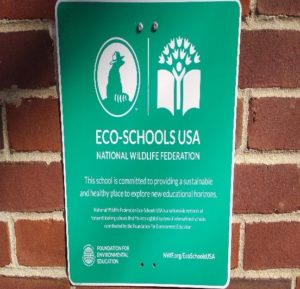 Although I’ve visited numerous schools in PA, I had never seen one designated as an Eco-School. I suppose that with my personal interest in gardening and bird watching, my interest was more than piqued.
Although I’ve visited numerous schools in PA, I had never seen one designated as an Eco-School. I suppose that with my personal interest in gardening and bird watching, my interest was more than piqued.
When I entered the classroom I was to observe, I noticed a window looking out into a garden area. On the windowsill was a pair of binoculars, which a student picked up soon after I settled in. She looked through the binoculars and I heard her say, “Oh, it’s a finch”. Growing more curious, I took a closer look. On the wall near the window were photographs of birds and other creatures native to our area. One of the photos showed a gold finch. When I had a chance to speak to the teacher, I had to compliment her on the wonderful pictures and of course, ask about the sign.
Classroom teacher Megan Habbersett was happy to talk about being a certified Eco-School. In order to claim Eco-School status, the site must be certified by the National Wildlife Foundation (NWF). Once certified, the garden area becomes a federally protected site. To me, this seemed like a large undertaking, but Megan went on to explain that she was familiar with the process from her in-laws. Her husband’s parents had a garden at their home that had been certified by the NWF years before. Megan was so intrigued by the beauty of the flowers, as well as the insects and birds attracted to their garden, that eventually she went on to do the same at her own home. Once she gained the experience of creating the special outdoor space at her own house, she felt compelled to do some research to find if a school setting could be given such certification. For Megan, combining her love of gardening with her desire to have her students appreciate the nature around them made becoming an Eco-School a win-win.
Habbersett told me that the garden space creates a wonderful opportunity for the children. To become certified, the school property has to have different types of trees with different foliage. 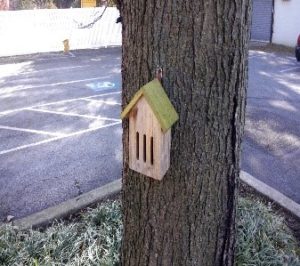 They also must provide birdfeeders on a variety of levels as well as a water source. A butterfly house and bee house on site create a truly perfect learning environment. Not only do the children assist by making some of the bird feeders, teachers can use the garden for hands-on lessons and activities. Themes like trees, plants, animals, soil, migration, and insects, among others, can be supported by the outdoor space. The children have a vested interest, especially on Fridays, when they proudly complete their tasks required to keep the garden flourishing. Students help by filling feeders, adding mealworms to soil, providing dry ears of corn for the squirrels and making sure flowers and plants are watered as needed. These lessons and experiences really help the children to better understand the world around them, which is a goal for Habbersett.
They also must provide birdfeeders on a variety of levels as well as a water source. A butterfly house and bee house on site create a truly perfect learning environment. Not only do the children assist by making some of the bird feeders, teachers can use the garden for hands-on lessons and activities. Themes like trees, plants, animals, soil, migration, and insects, among others, can be supported by the outdoor space. The children have a vested interest, especially on Fridays, when they proudly complete their tasks required to keep the garden flourishing. Students help by filling feeders, adding mealworms to soil, providing dry ears of corn for the squirrels and making sure flowers and plants are watered as needed. These lessons and experiences really help the children to better understand the world around them, which is a goal for Habbersett.
While touring the garden, I realized how many learning opportunities were available to this school within a small space. With the director’s permission, I snapped a few photos to share with you. Although many might be overwhelmed by taking on such a project, Habbersett assured me that there were many resources available through the NWF.
A few days after the assessment I went online to check out the NWF website, www.nwf.org. I quickly found a tab on their homepage titled “Educational Resources”. In this section they provide a Wildlife Guide, Educator Tools and information on Educational Programs. This quote from their site seemed to sum up the concept of the Eco-School I observed:
“To succeed as global citizens and future stewards of our planet, children and young adults should be well-versed in the underlying principles of nature and wildlife. Through educational programs focused on conservation and environmental knowledge, the National Wildlife Federation provides ways to create a lasting base of environmental literacy, stewardship, and problem-solving skills for today’s youth.”
Even if you don’t feel ready to take on Eco-School certification, there are many resources and ideas to assist you in teaching science-related topics on the NWF website. Perhaps start small and add a few elements to your classroom each year. By focusing lessons on plants, trees, insects and animals that your students can observe in their everyday life, you will surely help them better understand the piece of the world in which they live.
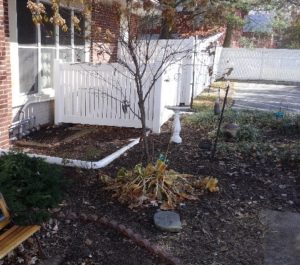
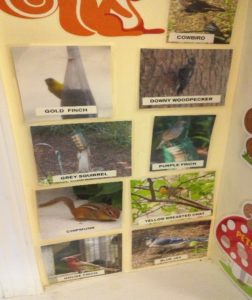



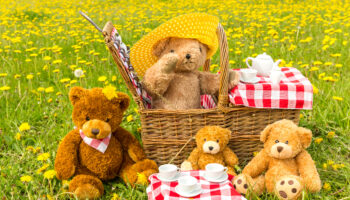
I think that is among the most significant information for me. Ashly Sanford Belsky